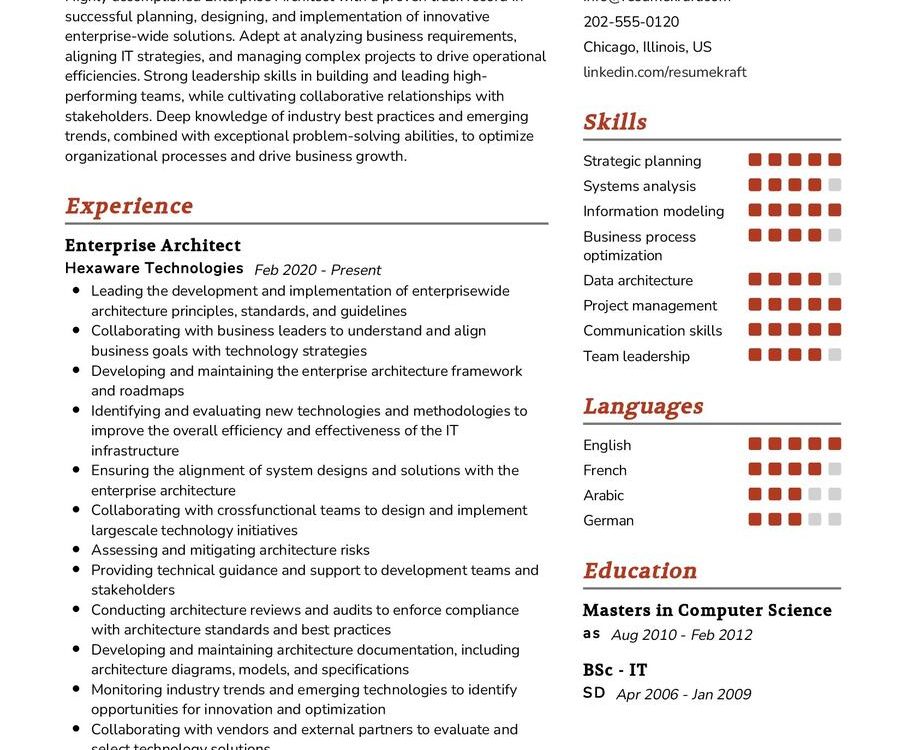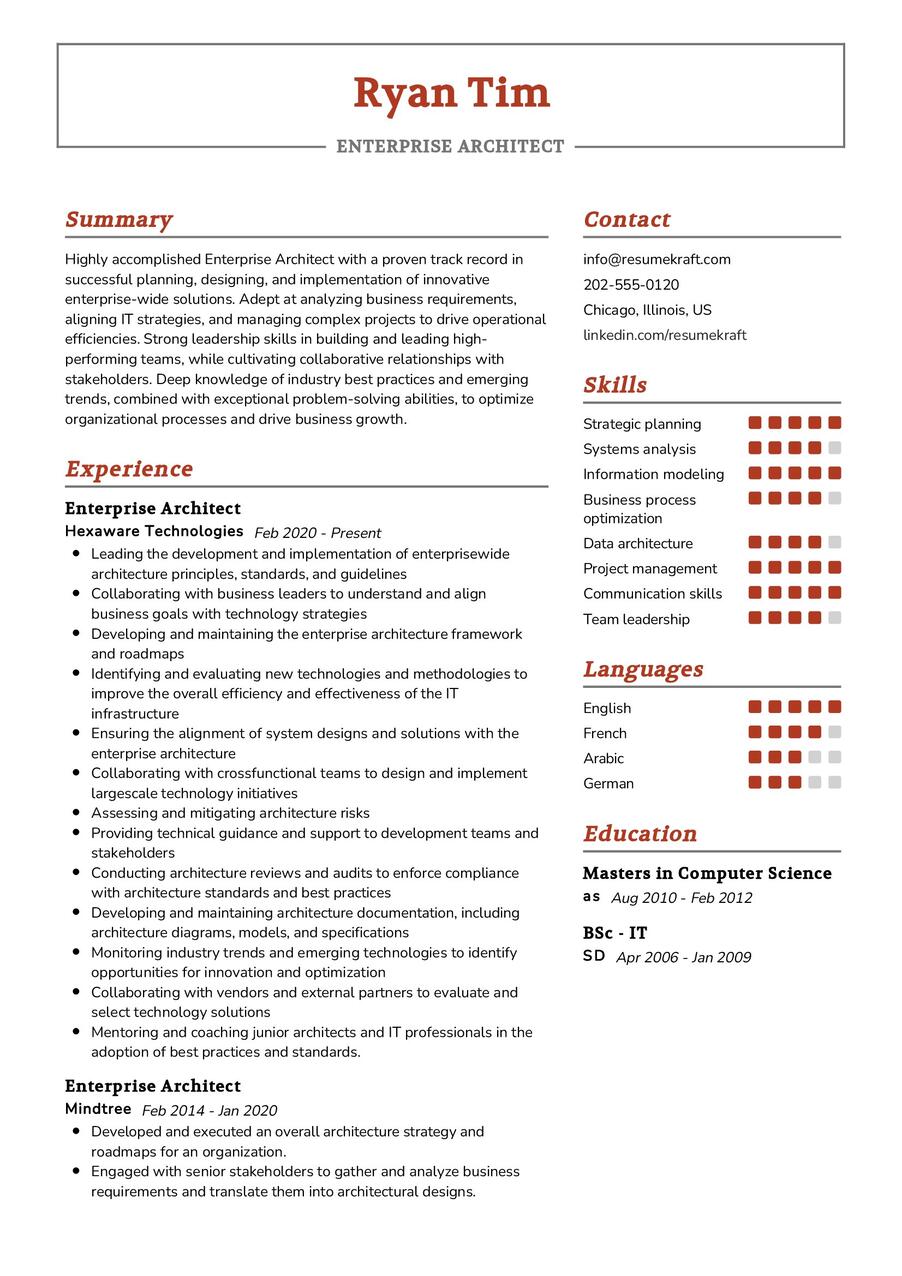Exploring the Role of an Enterprise Architect
As businesses navigate the complexities of the modern technological landscape, the position of an Enterprise Architect has emerged as a crucial linchpin in driving organizational success. This role requires a unique combination of technical prowess and strategic vision to architect and optimize complex systems. In this exploration, we’ll delve into the multifaceted responsibilities, job requirements, and key skills that define the role of an Enterprise Architect.
What are the Job Requirements for an Enterprise Architect?
Becoming an Enterprise Architect demands a specific set of qualifications and experiences, blending technical expertise with a strategic mindset. Let’s uncover the prerequisites necessary to embark on this fulfilling career journey:
- A Bachelor’s or Master’s degree in Computer Science, Information Technology, or a related field, establishing a solid foundation in the technical realm.
- Extensive knowledge of enterprise-level architecture frameworks and methodologies, such as TOGAF or Zachman.
- Proven experience in designing and implementing complex systems, showcasing a trajectory of increasing responsibility.
- Leadership and managerial skills, honed through experiences and possibly supplemented by relevant courses and certifications.
- Proficiency in enterprise-level software and technologies, demonstrating a deep understanding of the IT landscape.
- Ability to collaborate with diverse stakeholders, bridging the gap between technical teams and business leaders.
- Strong communication skills, essential for conveying complex technical concepts to non-technical stakeholders.
Additional certifications in enterprise architecture, such as TOGAF Certification, can significantly enhance your profile in the competitive job market.
Responsibilities of an Enterprise Architect
The role of an Enterprise Architect encompasses a spectrum of responsibilities, requiring a balance of technical acumen and strategic thinking. Let’s unravel the core duties that define this pivotal role:
- Developing and maintaining the enterprise architecture strategy, aligning it with the overall business objectives.
- Designing and overseeing the implementation of complex systems, ensuring they meet business requirements and technological standards.
- Collaborating with business leaders to understand their goals and translating them into architectural blueprints.
- Evaluating emerging technologies and trends to make informed recommendations for technology investments.
- Ensuring that the enterprise architecture supports scalability, flexibility, and security.
- Providing guidance to development teams, ensuring they adhere to architectural best practices and standards.
- Conducting regular reviews and assessments of existing systems to identify areas for improvement and optimization.
Each responsibility adds a layer to the intricate tapestry of an Enterprise Architect’s role, emphasizing the need for a holistic approach.
Crafting an Impressive Enterprise Architect Resume
Your resume is a gateway to your career story, and as an Enterprise Architect, it should reflect your technical prowess and leadership abilities. Here are some tips to help you create a compelling resume:
- Highlight your experience in designing and implementing enterprise-level solutions, emphasizing the impact on organizational efficiency.
- Showcase instances where your architectural decisions contributed to business growth or cost savings.
- Quantify your achievements with metrics, providing tangible evidence of your success in optimizing systems.
- List relevant certifications, demonstrating your commitment to staying current with industry best practices.
- Customize your resume for each application, tailoring it to match the specific requirements of the job description.
Each tip contributes to the creation of a resume that effectively communicates your unique value as an Enterprise Architect.
Enterprise Architect Resume Summary Examples
Your resume summary serves as the opening statement of your professional journey. Craft a powerful summary that encapsulates your experience and showcases your value:
- “Experienced Enterprise Architect with a proven track record in designing and implementing scalable systems that drive organizational success.”
- “Strategic-minded Enterprise Architect with expertise in aligning technology solutions with business objectives, contributing to significant cost savings.”
- “Innovative Enterprise Architect with a focus on leveraging emerging technologies to enhance organizational efficiency and competitiveness.”
Each summary provides a snapshot of your career, inviting potential employers to delve deeper into your expertise.
Building Your Enterprise Architect Resume Experience Section
Your experience section is the narrative of your professional journey. Paint a detailed picture of your accomplishments and milestones as an Enterprise Architect:
- “Led the design and implementation of a scalable enterprise system, resulting in a 30% improvement in overall business efficiency.”
- “Collaborated with cross-functional teams to align technology solutions with business goals, contributing to a 15% reduction in operational costs.”
- “Conducted regular system assessments, identifying and resolving potential vulnerabilities, ensuring the security and reliability of the enterprise architecture.”
Each experience entry adds depth to your resume, showcasing the tangible impact you’ve made in your role as an Enterprise Architect.
Education Section for Your Enterprise Architect Resume
Your educational background provides the foundation for your career. List your academic achievements and relevant certifications to bolster your resume:
- Master of Science in Computer Science, XYZ University, 2018.
- Bachelor of Technology in Information Technology, ABC University, 2014.
- TOGAF Certification, demonstrating expertise in enterprise architecture, 2019.
Each educational entry reinforces your qualifications and showcases your commitment to continuous learning in the field of enterprise architecture.
Key Skills for Your Enterprise Architect Resume
Your skill set is your toolkit, and as an Enterprise Architect, it should reflect a diverse range of abilities. Let’s categorize them into soft and hard skills:
Soft Skills:
- Leadership and team management, essential for guiding teams in implementing architectural solutions.
- Communication and interpersonal skills, crucial for conveying complex technical concepts to non-technical stakeholders.
- Strategic thinking, the ability to align technology solutions with overarching business objectives.
- Problem-solving abilities, necessary for addressing challenges in the design and implementation of enterprise systems.
- Adaptability and resilience, crucial for navigating the ever-evolving landscape of technology and business.
Hard Skills:
- Expertise in enterprise-level architecture frameworks and methodologies, such as TOGAF or Zachman.
- Proficiency in enterprise-level software and technologies, showcasing a deep understanding of the IT landscape.
- System design and implementation, demonstrating hands-on experience in creating scalable and efficient solutions.
- Security architecture, ensuring the safeguarding of sensitive data and systems.
- Evaluation of emerging technologies, enabling informed decision-making for technology investments.
Each skill in your arsenal contributes to your ability to excel as an Enterprise Architect.
Common Mistakes to Avoid When Writing an Enterprise Architect Resume
Steer clear of common pitfalls to ensure your resume stands out for the right reasons. Here are some mistakes to avoid:
- Avoid using generic terms; instead, tailor your resume to highlight your unique fit for each role.
- Focus on showcasing achievements rather than listing job duties, providing depth to your narrative.
- Don’t underestimate the importance of a cover letter; use it to tell your story and connect with potential employers.
- Balance technical details; don’t overload your resume with jargon that may obscure your value.
- Proofread meticulously to maintain a polished and professional image.
Each mistake represents a potential roadblock; by avoiding them, you ensure a clear path to crafting an authentic and compelling Enterprise Architect resume.
Key Takeaways for Your Enterprise Architect Resume
Summarizing the key points for crafting an impactful Enterprise Architect resume:
- Emphasize your experience in designing and implementing complex systems, showcasing tangible results.
- Showcase your leadership abilities, highlighting instances where your decisions positively impacted the organization.
- Quantify your achievements with metrics, providing concrete evidence of your contributions.
- Include relevant certifications to demonstrate your commitment to staying current with industry best practices.
Your resume is not just a document; it’s a canvas where you paint your career story of growth, learning, and leadership. Best of luck!
Finally, feel free to utilize resources like AI Resume Builder, Resume Design, Resume Samples, Resume Examples, Resume Skills, Resume Help, Resume Synonyms, and Job Responsibilities to create a standout application and prepare for the Enterprise Architect job interview.


